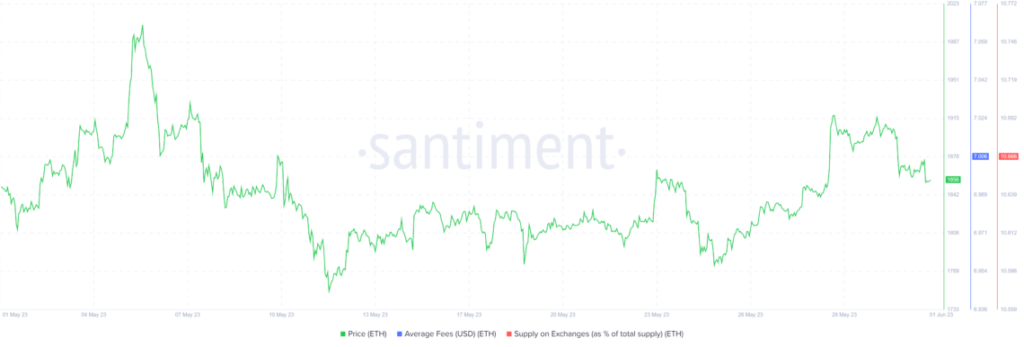Ethereum fees have finally normalized after peaking at an astounding $14 per transaction in May 2023, making the cryptocurrency more accessible and promoting its usage. With prices now considerably lower, users are taking advantage of Ethereum’s diverse applications, and the trend of self-custody is gaining momentum. Remarkably, only 9.9% of the digital asset now resides on exchanges, highlighting the growing preference for self-custody among Ethereum holders.
The sharp decline in Ethereum fees can be attributed to various factors, including the ongoing development and implementation of Ethereum 2.0, which has significantly improved the network’s scalability and efficiency. Layer 2 solutions, such as Optimism and zkSync, have also played a crucial role in reducing congestion and lowering transaction costs on the Ethereum blockchain.
As a result, users are now more inclined to explore Ethereum’s numerous use cases, ranging from decentralized finance (DeFi) platforms to non-fungible tokens (NFTs) and decentralized applications (dApps). The reduced fees have also made Ethereum a more attractive option for developers, encouraging them to build innovative solutions on the platform and boosting its overall utility.
Furthermore, the fee decline has fueled the self-custody trend among Ethereum users. With the percentage of ETH held on exchanges hitting an all-time low of 9.9%, it is evident that more individuals are opting to store their assets in personal wallets or hardware wallets, such as Ledger or Trezor. This shift towards self-custody demonstrates a growing awareness of securing one’s digital assets and minimizing the risk of hacks, theft, and other potential threats associated with centralized exchanges.
The self-custody trend also underscores the maturation of the Ethereum ecosystem as users become more knowledgeable about best practices for securing their digital assets. Notably, the proliferation of decentralized exchanges (DEXs) like Uniswap and SushiSwap has made it easier than ever for users to trade their assets without relying on centralized platforms. This accessibility, coupled with the lower fees, has further empowered the Ethereum community to take control of their assets and financial future.

Source: Sanabse
As Ethereum continues to evolve and improve its scalability, transaction fees are expected to remain stable and affordable in the long run. This development, in turn, will likely contribute to the ongoing growth and expansion of the Ethereum ecosystem and the self-custody movement.
In conclusion, Ethereum’s falling transaction fees have significantly impacted the cryptocurrency’s utility and the self-custody trend among its users. The normalization of prices has made Ethereum more accessible, enabling users to explore its various applications and fostering innovation within the ecosystem. At the same time, the self-custody movement is gaining traction, with an increasing number of individuals opting to secure their digital assets independently. These developments paint a promising picture of the future of Ethereum and its potential to revolutionize the world of finance and technology.












Leave a Reply